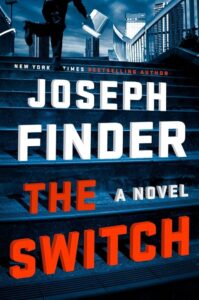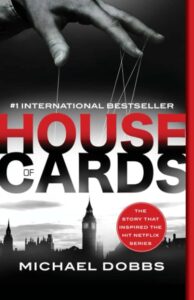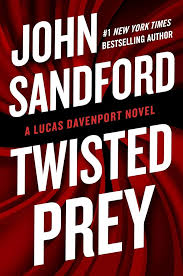In novels, the good guys usually win because that’s what most of us want both in real life and in fiction. We want to see the bad guys punished. We want justice and decency to triumph. But I’ve noticed lately that in many novels tied to politics that the good guys don’t always win—and I can’t help but think that this phenomenon reflects the world we actually live in.
My latest Joe DeMarco thriller, Untouchable, was inspired by recent events having to do with the late Jeffrey Epstein and documents stored in the National Archives. I mean documents actually in the Archives, and not at someone’s golf course. In Untouchable, the president of the United States is an accomplice to a murder, his national security advisor tries his best to cover up what his boss did, and my protagonist, DeMarco, ultimately realizes that the president will get away with what he’s done. When I started writing the book, it never occurred to me that a president could really be immune from any crimes he committed. By the time it was published, that appeared to be the law of the land. But the theme of Untouchable—that corrupt politicians, abetted by their underlings, escape conventional justice—is one that several writers that I admire have also explored.
In John Sandford’s novel Silken Prey, he writes about a beautiful sociopath named Taryn Grant running for the U.S. Senate—as if the Senate doesn’t have enough sociopaths. To win the election, Grant tries to frame her opponent for a crime he didn’t commit and then several people die because of what she did. But Grant doesn’t commit any crimes herself. Her loyal henchmen commit the crimes. And because none of the crimes can be tied directly to her, Grant gets away with it! Her henchmen all bite the dust, but she’s elected to the Senate, her opponent is humiliated, and she moves on to Washington where she’s thinking her next stop will be the White House. It was a good book with a bittersweet conclusion and that could have been the end of things, but then Sandford brings Grant back in a sequel called Twisted Prey where she finally gets her just desserts—but not in a court of law because the law can’t touch her.

Another book with a power-hungry senator is Joseph Finder’s book Switch. In Switch, the senator puts classified documents on her laptop so she can read them at her convenience. Putting classified documents on a personal computer is illegal, of course, but then the senator’s laptop accidentally ends up in the hands of an innocent businessman. (The businessman’s laptop and the senator’s are switched while going through airport security.) Once the switch is discovered, the senator’s loyal chief of staff sets off to get her laptop back. What I liked about Switch is that the chief of staff and the businessman both start off trying to do the right thing but by the time they’re finished, they’ve broken multiple laws and people have died. Also, a theme common to this book and the others discussed here is that various government agencies like the FBI and the NSA, instead of following the law, have their own self-serving agendas. As for the senator? You guessed it. She gets away with what she did.

The topic of corrupt politicians and corrupt bureaucrats isn’t limited to U.S. fiction. In Mick Herron’s Slow Horses series, Herron’s protagonist, burnt-out spy Jackson Lamb, is being constantly undermined by his boss, Diane Taverner, who’s the head of his own intelligence service. And to make matters worse, Taverner’s bosses—the British prime minister or the minister’s lackies—also have their own self-serving agendas and they’re often at odds with both Taverner and Lamb. So Lamb is usually fighting two battles simultaneously: one against the actual bad guys and one against the guys who are supposed to be the good guys—his bosses. The Slow Horses books make me think of what’s happening in the FBI today, where FBI agents not only have to fight crime but survive in an environment where the people they work for care more about loyalty to those in power than loyalty to the law.

In the Netflix series House of Cards, Kevin Spacey plays a corrupt congressman named Francis Underwood who’s willing to do anything to attain power. The television series is based on a book with the same title by another British author, Michael Dobbs. In Dobbs’ House of Cards, the corrupt politician is Francis Urquhart, whovanquishes one rival after another by leaking false stories to the press, blackmailing his colleagues, and ultimately killing a reporter who could have exposed him. I mention this book not only because it’s a good book, but because it was written in 1989, almost forty years ago. As Shakespeare said: What is past is prologue.

Lastly, there are Martin Cruz Smith’s books with his protagonist Arkady Renko, who was introduced to us in Gorky Park. What makes Smith’s Renko books so fascinating is that EVERYBODY is corrupt. In my book and Sandford’s and Finder’s, there is always the possibility that law enforcement or good politicians or good journalists will save the day. Not so in Arkady Renko’s world where the Russian government is not only corrupt to the core, but also controls the media as well as law enforcement, and the villains in Smith’s books aren’t so much the murderers that Renko is chasing but the entire system that employs him to chase them. Renko always prevails, usually worse for the wear, but the corrupt system he works for remains intact.
And maybe we should all take heart in that. That no matter how it sometimes seems as if the corrupt politicians often win, both in real life and in fiction, the Renkos of the world keep on fighting.
***




















